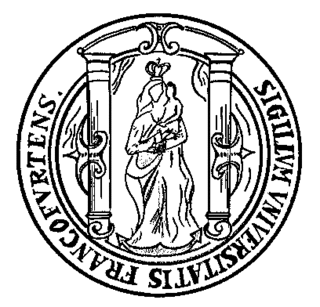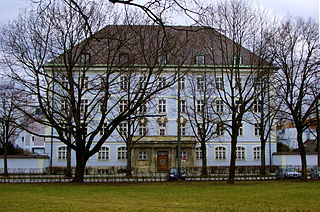
Frankfurt (Oder) is a town in Brandenburg, Germany, located on the west side of the Oder River, on the Germany-Poland border, about 80 kilometres (50 mi) east of Berlin.
Märkisch-Oderland is a Landkreis (district) in the eastern part of Brandenburg, Germany. Neighboring are the district Barnim, the country Poland, the district-free city Frankfurt (Oder), the district Oder-Spree and the Bundesland Berlin. The administrative seat is Seelow but the largest town is Strausberg.
Oder-Spree is a Kreis (district) in the eastern part of Brandenburg, Germany. Neighboring are the district Märkisch-Oderland, the district-free city Frankfurt (Oder), Poland, the districts Spree-Neiße and Dahme-Spreewald, and the Bundesland Berlin.

Martin Opitz von Boberfeld was a German poet, regarded as the greatest of that nation during his lifetime.

European University Viadrina Frankfurt (Oder) is a university located at Frankfurt (Oder) in Brandenburg, Germany. It is also known as the University of Frankfurt (Oder). The city is on the Oder River, which marks the border between Germany and Poland. With 5,200 students — around 1,000 of whom come from Poland — and some 160 teaching staff, the Viadrina is one of Germany's smallest universities.

Kunowice (; is a village in the administrative district of Gmina Słubice, within Słubice County, Lubusz Voivodeship, in western Poland, near the Oder river and the German border. It lies approximately 5 kilometres east of Słubice, 60 km south-west of Gorzów Wielkopolski, and 75 km north-west of Zielona Góra.

The German National Library is the central archival library and national bibliographic centre for the Federal Republic of Germany. Its task is to collect, permanently archive, comprehensively document and record bibliographically all German and German-language publications since 1913, foreign publications about Germany, translations of German works, and the works of German-speaking emigrants published abroad between 1933 and 1945, and to make them available to the public. The DNB is also responsible for the Deutsche Nationalbibliografie and several special collections like the Deutsches Exilarchiv 1933–1945, Anne-Frank-Shoah-Bibliothek and the Deutsches Buch- und Schriftmuseum. The German National Library maintains co-operative external relations on a national and international level. For example, it is the leading partner in developing and maintaining bibliographic rules and standards in Germany and plays a significant role in the development of international library standards. The cooperation with publishers has been regulated by law since 1935 for the Deutsche Bücherei Leipzig and since 1969 for the Deutsche Bibliothek Frankfurt.

A Term Catalogue is a serial publication compiled to inform customers—most importantly book traders from other cities—of the book production as available on the book fairs. The first such catalogue was issued by Georg Willer in Augsburg in 1564. Several projects followed the model including the series of English Term Catalogues issued by John Starkey and Robert Clavell under the title Mercurius Librarius, or, a catalogue of books from 1668 to 1711. "Term" referred to the dates of the fairs that would be held as platforms of the trade.

Block books or blockbooks, also called xylographica, are short books of up to 50 leaves, block printed in Europe in the second half of the 15th century as woodcuts with blocks carved to include both text (usually) and illustrations. The content of the books was nearly always religious, aimed at a popular audience, and a few titles were often reprinted in several editions using new woodcuts. Although many had believed that block books preceded Gutenberg's invention of movable type in the first part of the 1450s, it now is accepted that most of the surviving block books were printed in the 1460s or later, and that the earliest surviving examples may date to about 1451.
The Stasi Records Agency was the organisation that administered the archives of Ministry of State Security (Stasi) of the former German Democratic Republic. It was a government agency of the Federal Republic of Germany. It was established when the Stasi Records Act came into force on 29 December 1991. Formally it was called the Federal Commissioner for the Records of the State Security Service of the former German Democratic Republic ; the official German abbreviation was BStU. On June 17, 2021, the BStU was absorbed into the German Federal Archives (Bundesarchiv).

The Historical Archive of the City of Cologne is the municipal archive of Cologne, Germany. It ranks among the largest communal archives in Europe.

Rathaus Rapperswil is the former Rathaus of the city government of medieval town of Rapperswil, Canton of St. Gallen in Switzerland. Today, the building houses a café and restaurant, the city archives and a collection of stained glass windows, silverware and paintings. The building and the city archives are listed in the Swiss inventory of cultural property of national and regional significance.

The Jewish Museum Frankfurt am Main is the oldest independent Jewish Museum in Germany. It was opened by Federal Chancellor Helmut Kohl on 9 November 1988, the 50th anniversary of Kristallnacht.

The Frankfurt (Oder) tramway network is a network of tramways forming part of the public transport system in Frankfurt (Oder), a town in the federal state of Brandenburg, Germany, on the Oder River, at the German-Polish border.

Sonnenburg concentration camp was opened on 3 April 1933 in Sonnenburg near Küstrin in a former Neumark prison, on the initiative of the Free State of Prussia Ministry of the Interior and Justice.
The Kleist Theater was a theatre and opera house in Frankfurt (Oder), Germany. It opened in 1945 and was named after Heinrich von Kleist in 1952. It closed in 2000.

The Stadtarchiv Speyer is the oldest municipal archive of the Palatinate.

Rudolf Daniel Ludwig Cronau was a German-American painter, illustrator and journalist

The Stadtarchiv München is the archive for the accumulating material from all municipal offices, businesses and companies of Munich; In addition, private holdings are also archived there. The Stadtarchiv is located in the Schwabing-West district. The older part of the building used to serve as a municipal military office.

Frankfurt Charterhouse was a Carthusian monastery or charterhouse in Frankfurt an der Oder in Brandenburg, Germany.
















